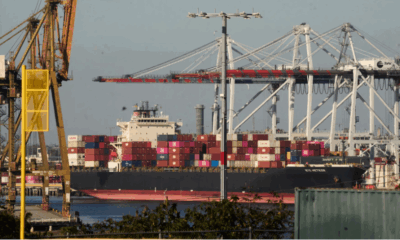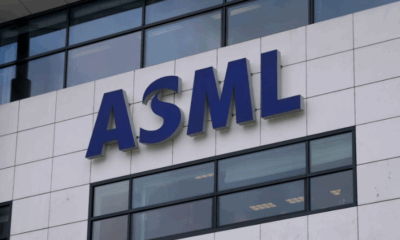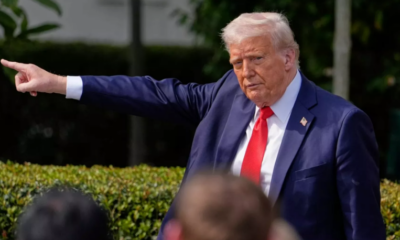Business
WH Smith to Exit UK High Streets in £76M Deal, Marking Another Blow to Retail Sector
British books and stationery retailer WH Smith is set to disappear from UK high streets following a £76 million (€91.2 million) deal to sell its 480 retail outlets to private equity firm Modella Capital, the owner of Hobbycraft.
The move is the latest in a series of high-profile closures affecting the UK retail landscape, which has struggled to recover from the pandemic. WH Smith, a brand with over two centuries of history, will continue to operate under its name in airports, railway stations, and hospitals, but its high street stores will be rebranded as TGJones.
Retail Shake-Up as Modella Capital Expands Portfolio
Modella Capital, which has previously acquired The Original Factory Shop and Hobbycraft, will take control of WH Smith’s high street operations, including several stores in shopping centres and retail parks. However, the exact timeline for the transition remains undisclosed.
WH Smith’s Post Office counters will continue running as usual, and the company has reassured customers that business operations will remain normal during the transition. The retailer, which employs around 5,000 people across more than 1,100 stores in the UK, has also hinted at exploring further strategic changes, including the potential sale of its digital greetings card brand, Funky Pigeon.
Despite the deal, concerns remain over potential job losses, though Modella has not confirmed whether redundancies will follow. The firm has stated that new product ranges will be introduced, but further operational details have not yet been revealed.
WH Smith Shifts Focus to Travel Business
The decision to exit high streets comes as WH Smith pivots towards its more profitable travel division. Group CEO Carl Cowling highlighted that the high street business, while still profitable, had become a smaller part of WH Smith’s overall operations amid the company’s international expansion.
“Our UK High Street business has been a good, cash-generating operation, but with our rapid international growth, now is the right time for a new owner to take it forward,” Cowling said. “This will allow WH Smith’s leadership team to focus exclusively on our travel business, which has stronger growth prospects.”
Russ Mould, investment director at AJ Bell, noted that the deal enables WH Smith to concentrate on expanding its travel retail footprint. However, he cautioned that losing the WH Smith name from high streets could negatively impact footfall.
“The WH Smith brand was a key reason why its stores survived in an increasingly challenging retail environment,” Mould said. “Shoppers relied on the retailer for specific items, and removing the brand could see customer traffic decline under the new TGJones name.”
High Streets Continue to Struggle
The departure of WH Smith from UK high streets is expected to further weaken an already struggling retail sector. The pandemic and changing consumer habits have led to a wave of closures, including Debenhams, Daniel of Ealing, and Cool Britannia. Retailers like New Look, Quiz Clothing, and Select Fashion have also been forced to shut multiple locations.
High street banks have followed a similar trend, with major lenders like Halifax, Lloyds, Bank of Scotland, and Barclays closing branches in response to shifting consumer behaviour.
Despite these challenges, the retail sector showed resilience in February, with the Office for National Statistics (ONS) reporting a 1% monthly increase in sales volumes. This exceeded market expectations of a 0.3% decline and followed a 1.4% rise in January.
Household goods led the growth, experiencing their strongest monthly performance since April 2021, while clothing and footwear sales also contributed positively. However, food store sales saw a decline.
On an annual basis, retail sales in February rose 2.2%, surpassing analyst projections of a 0.5% gain.
Consumer Spending Outlook Remains Mixed
Looking ahead, consumer spending trends appear uncertain. A McKinsey & Company report found that while 22% of shoppers plan to increase spending on garden furniture and 17% on hotels, many are cutting back in other areas.
“Nearly 40% of consumers plan to reduce clothing purchases, and almost half (49%) intend to spend less on jewellery,” said Sagar Shah, associate partner at McKinsey & Company.
He also noted that while inflation is easing, it has yet to drive stronger sales volume growth. Rising wages are putting pressure on retailers’ margins, forcing them to adjust pricing strategies and promotional tactics to maintain profitability.
As WH Smith transitions out of the high street retail landscape, the sector faces ongoing uncertainties, with businesses having to adapt to changing consumer preferences and economic conditions.
Business
DHL Express to Suspend High-Value Consumer Shipments to U.S. Amid Regulatory Changes

DHL Express, the international courier division of Germany’s Deutsche Post, announced it will temporarily suspend global business-to-consumer (B2C) shipments valued over $800 to individuals in the United States starting April 21. The move comes in response to new U.S. customs regulations that have extended clearance times for incoming goods.
According to a notice published on the company’s website, the suspension affects only shipments above the $800 threshold sent to private individuals. Business-to-business (B2B) shipments will continue but may experience delays due to the new processing requirements. Shipments under $800, whether destined for individuals or businesses, remain unaffected.
The change follows an April 5 update to U.S. customs rules, which now require formal entry processing for all imports valued over $800. Previously, this threshold stood at $2,500. DHL cited the revised policy as the reason for the temporary suspension, as the additional paperwork and procedural requirements have significantly slowed customs clearance.
“This is a temporary measure,” the company stated, without specifying when services might resume.
While the announcement was undated, online metadata indicates it was compiled on Saturday. The update marks a significant shift for international logistics companies that rely on streamlined processes to handle high-volume e-commerce shipments.
DHL’s decision comes amid rising trade tensions and shifting import policies in the United States, particularly concerning packages from China and Hong Kong. Last week, Hongkong Post suspended sea mail services to the U.S., accusing Washington of “bullying” after the United States revoked duty-free trade provisions for packages from the region.
In response to earlier inquiries from Reuters, DHL emphasized its commitment to compliance, saying it would continue processing shipments from Hong Kong “in accordance with the applicable customs rules and regulations.” The company also said it is working with customers to help them adapt to the upcoming changes, particularly those set to take effect on May 2.
Industry analysts say the new U.S. customs policy could have a wide-reaching impact on cross-border e-commerce, as formal entry requirements typically involve additional documentation, processing fees, and longer delivery times. Retailers and logistics firms alike are now reassessing their operations to minimize disruption for customers.
DHL has not provided a specific date for when high-value B2C shipments to the U.S. will resume but indicated that the pause is a precautionary response to the evolving regulatory environment.
Business
Trump Administration Imposes New Fees on Chinese Ships, Escalating Trade Tensions
The Trump administration on Thursday announced new fees targeting Chinese-built and Chinese-owned vessels docking at U.S. ports, escalating the ongoing trade war between Washington and Beijing. The move is aimed at countering China’s growing dominance in the global shipbuilding industry and protecting U.S. maritime interests.
The announcement, made by the Office of the United States Trade Representative (USTR), follows a year-long investigation launched under the Biden administration into China’s shipbuilding practices. USTR Ambassador Greer said the decision is designed to “begin to reverse Chinese dominance, address threats to the U.S. supply chain, and send a demand signal for U.S.-built ships.”
The new policy will introduce fees based on net tonnage per voyage for Chinese-built and owned vessels entering U.S. ports. This first phase is set to take effect in 180 days. A second phase, targeting foreign-owned liquefied natural gas (LNG) vessels built in China, will be implemented within three years.
The fees could reach as high as $1 million for each Chinese-built ship and $1.5 million for foreign-owned carriers with Chinese-built vessels in their fleets, according to findings from the USTR investigation. The move marks a significant shift in maritime trade policy, as the U.S. seeks to reduce its dependency on Chinese-made ships.
The USTR probe, launched in April 2024 under Section 301 of the 1974 Trade Act, was prompted by a petition from five national labor unions raising concerns over China’s increasing control over global shipping. The USTR concluded that China’s practices unfairly displaced foreign competitors and reduced global competition in maritime logistics.
China currently dominates the global shipbuilding market, with Chinese-built vessels accounting for 81% of the total market share in 2024. In the energy sector, China controls 48% of the liquefied petroleum gas (LPG) vessel market and 38% of the LNG sector, according to Veson Nautical.
In response to last year’s proposal, China’s Ministry of Commerce criticized the U.S. investigation as “a mistake on top of a mistake.” However, no official statement has been issued following the latest U.S. policy announcement.
Despite the new maritime fees, President Trump appeared to signal a pause in further tariff hikes. Speaking to reporters, he said, “At a certain point, I don’t want [tariffs] to go higher because… you make it where people don’t buy.” Trump indicated he may lower existing tariffs to avoid further disruption in trade flows.
Currently, the Trump administration has imposed tariffs of 145% on all Chinese imports, while China has retaliated with 125% tariffs on U.S. goods. In response, Beijing has hinted at shifting its countermeasures to the U.S. services sector, including legal consultancy, tourism, and education.
As tensions continue to rise, the shipping fee move represents a broader effort by Washington to reshape global trade and strengthen domestic manufacturing — though it risks inflaming economic ties with China even further.
Business
Global Luxury Sector Faces New Blow as US-China Trade War Escalates
The global luxury industry, already grappling with declining demand and changing consumer habits, faces a new hurdle as the trade war between the United States and China intensifies. Analysts warn that the sector’s fragile recovery may be further threatened by President Donald Trump’s recent decision to hike tariffs on Chinese goods to as high as 245%.
According to a memorandum seen by Euronews, the luxury market is forecasted to grow modestly at 1% to 3% annually between 2024 and 2027. This is a sharp slowdown compared to the 5% yearly growth seen between 2019 and 2023, and 9% between 2021 and 2023, as highlighted in a report by McKinsey.
China and the US are two of the largest luxury markets globally. In 2023, China accounted for 22%–24% of global luxury consumption, while US consumers contributed around 21% of total revenue in 2024, according to Bain & Company and Bank of America. Popular products in both markets include handbags, cosmetics, footwear, and leather goods, with brands such as Chanel, Dior, Louis Vuitton, Gucci, and Prada dominating sales.
However, economic slowdowns in both countries, combined with rising inflation and interest rates, have already caused luxury shoppers to scale back. The cost of living crisis in several regions has shifted consumer preferences toward more durable and budget-conscious purchases. Furthermore, luxury brands that raised prices post-pandemic without matching innovation are losing their exclusivity appeal.
The latest round of US tariffs, coupled with retaliatory Chinese tariffs currently at 125%, have added fresh uncertainty to the sector. Global stock markets have responded negatively, wiping billions in market capitalization from luxury giants. Shares of Lululemon Athletica dropped 20.7% on Nasdaq, Prada Group fell 23.4% on the Hong Kong Stock Exchange, and Kering and LVMH declined 26.3% and 19.9% respectively on Euronext Paris.
LVMH, often seen as a bellwether for the luxury industry, reported a 2% dip in Q1 2025 revenue to €20.3 billion. Fashion and leather goods revenue dropped 4%, perfumes and cosmetics remained flat, and wines and spirits fell 8%. Only watches and jewelry showed growth with a modest 1% increase.
Beyond China, US tariffs on EU goods—although reduced to 10% temporarily—also pose risks. The US imports various luxury products from Europe, including wine, chocolate, high-end apparel, and cars. These tariffs could increase prices for American consumers, potentially leading to reduced spending.
Additionally, the fragmented and globalized supply chains of luxury brands may incur hidden costs due to tariffs, further squeezing margins and complicating logistics.
In a surprising twist, the rising cost of luxury imports has led some Chinese manufacturers to promote knock-off products directly to US consumers via platforms like TikTok. Claiming to be original equipment manufacturers, they offer imitations of products like Birkin bags and Lululemon leggings at steep discounts. While their claims are largely unverified, Chinese wholesale platform DHgate has surged to the number two spot on the US Apple App Store, signaling growing consumer interest in alternatives amid rising prices.
As trade tensions deepen, the luxury sector is bracing for further disruptions in an already turbulent market landscape.
-

 Business11 months ago
Business11 months agoSaudi Arabia’s Model for Sustainable Aviation Practices
-

 Business11 months ago
Business11 months agoRecent Developments in Small Business Taxes
-

 Politics11 months ago
Politics11 months agoWho was Ebrahim Raisi and his status in Iranian Politics?
-

 Business10 months ago
Business10 months agoCarrectly: Revolutionizing Car Care in Chicago
-

 Business10 months ago
Business10 months agoSaudi Arabia: Foreign Direct Investment Rises by 5.6% in Q1
-

 Technology11 months ago
Technology11 months agoComparing Apple Vision Pro and Meta Quest 3
-

 Politics11 months ago
Politics11 months agoIndonesia and Malaysia Call for Israel’s Compliance with ICJ Ruling on Gaza Offensive
-

 Technology11 months ago
Technology11 months agoRecent Developments in AI Ethics in America


























